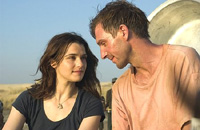Based on a novel by John Le Carré, The Constant Gardener is more of a political message delivery system than a movie. It is also extremely well made. And unlike, say, The Interpreter—the recent Nicole Kidman-Sean Penn flick which paired Hollywood glamour with trite social parables, and ended up sending out muddled messages—this new film knows how to put its craftsmanship to the service of its message, which is fierce and focused throughout. Many political thrillers use the travails of the so-called Third World as an excuse to show glamorous people doing exciting things, but The Constant Gardener comes at it the other way ’round. Here, the mysteries and conspiracies take us deeper into an African situation which, the film assures us, reflects the reality on the ground.

Given the film’s broader agenda—its producers have already set up a charity to benefit the people of Kenya—it may seem churlish to complain about things like, oh, the script. But this is a fictitious story, not a documentary, and the script is the one place where the movie’s craftsmanship suffers. Near the beginning, Justin Quayle (Ralph Fiennes), a diplomat with the British High Commission in Nairobi, is watering his plants when he is told that his wife Tessa (Rachel Weisz), a passionate political activist, has died in what the authorities are saying might have been a bandit raid, but might also have been a crime of passion committed by a possible lover. The story then moves forward and backward in time, as Justin investigates the circumstances of Tessa’s death and relives the key moments in their relationship—and while it’s a pleasure to watch these actors work together, it’s a little difficult to see what their characters are doing together in the first place.

It turns out the first time they met was when Tessa stood up after one of Justin’s speeches and ranted at him about Britain’s involvement in the Iraq war; and it’s an open question whether the filmmakers intended to make her sound like a patchwork of Michael Moore-ish slogans from a couple years ago, or whether they honestly wanted to use this opportunity to squeeze another set of messages into their movie. At any rate, Justin, being a decent sort, offers to take Tessa out for coffee, just to show there’s no hard feelings—and before long, they’ve had sex. Then, a short while later, and even though they don’t know each other all that well, she suggests getting married so that he can take her with him to Kenya.
People do impulsive things all the time, but still, you have to wonder, why would a man who represents his government for a living marry a woman about whom he knows little beyond the fact that her “work” requires her to actively oppose his government? The film never really tells us, and it is difficult to sympathize when Tessa starts raising a stink at embassy parties and Justin asks her to tone it down a little. On the other hand, as Tessa begins to investigate the local activities of pharmaceutical companies (who she believes are using Africans as unwitting guinea pigs for their newly-developed drugs), and as rumors begin to circulate about her frequent association with a local doctor named Arnold Bluhm (Hubert Koundé), it is easy to see why Justin might begin to feel that she has been using him.

Fiennes does a brilliant job of communicating his character’s inner turmoil through subtle facial expressions and inflections of his voice. The moment in which Justin’s colleague Sandy Woodrow (Danny Huston) tells him of his wife’s death and possible affair—the camera stays on Justin’s face the whole time—hints at a world of pain and grief and regret, all of it buried under a veneer of resolve, as Justin takes it all in and simply replies, “Good of you to tell me, Sandy. It can’t have been easy.” Expect to see this clip on Oscar night.
But Justin does not simply keep a stiff upper lip. He needs to know why his wife died. And the more he digs into the evidence around her death, the more he learns about her life, and thus the more he learns about her work, and thus the more he comes to see that the people he works for really are as corrupt as Tessa believed. As Fiennes himself has noted, the irony of this story is that Tessa’s hot-headed passion for the truth does not accomplish all that much, at least not directly, because it gets her killed; but Justin’s very constancy, his quiet commitment to finishing the job he started, helps him to achieve her goals.

Unfortunately, as Justin hops all over the globe looking for answers, the story begins to feel increasingly compressed. Director Fernando Meirelles was nominated for an Oscar for his dazzling work on City of God, which told multiple stories set within a Brazilian slum, so he is no stranger to complexity; indeed, it is spellbinding to watch the fluidity with which he moves back and forth in time, to the point where Tessa becomes such a vivid presence that you almost forget she died in the film’s opening scenes. But the screenplay, by Jeffrey Caine, must of necessity cut a sprawling plot down to a couple of hours; and Justin, along with the audience, barely has time to adjust to each new country he visits—England, Germany, Sudan, Kenya again—before the story compels him to hop another flight.
Meirelles and his cinematographer, César Charlone, were clearly impressed by the story’s setting—both its landscape and its social milieu. And the images they create are often very striking indeed. But the film tries to cram too much information into its two hours, and it does such a good job of convincing us that things were amiss in the Quayles’ marriage that, when it tries to cast a more positive light on Justin’s memories, it doesn’t quite work. Justin’s love for his dead wife is moving, and haunting, but it rests more on the strengths of the actors—and Fiennes in particular—than on the material they were given to work with. Even if Tessa really did think the marriage was more than just a helpful way to further a political agenda, the filmmakers themselves seem to have settled for just that.
Talk About It
Discussion starters
- What sort of approach works best, when dealing with social or political problems? Tessa’s hot-headed zeal? Justin’s quieter diplomacy?
- Does Tessa’s death accomplish anything? Could she have accomplished even more if she had done more to protect her own life? Does anyone else’s death accomplish anything?
- Do you “buy” the relationship between Justin and Tessa? Do you think they would have ever gotten together in the first place? If so, why? If not, then how does this affect how you respond to the rest of the film?
- Do you think a marriage can survive when people have very different political beliefs, or when they have jobs that might pit them against each other? Are some beliefs negotiable? If so, which ones? Is it possible to keep work separate from one’s domestic life?
- How would you have dealt with Justin’s suspicions that his wife might have been seeing someone else? Should he have confronted her? If so, why, or how? If not, why not?
The Family Corner
For parents to consider
The Constant Gardener is rated R for language, some violent images and sexual content/nudity. Several scenes feature dead and badly damaged bodies, and much of the nudity involves a married couple, one of whom is pregnant in several scenes.
Photos © Copyright Focus Features
Copyright © 2005 Christianity Today. Click for reprint information.
What Other Critics Are Saying
compiled by Jeffrey Overstreet
from Film Forum, 09/08/05
The Constant Gardener closes the summer movie season with an unusually challenging thriller. The film is based on the popular novel by John le Carré and directed by Fernando Mereilles, whose acclaimed debut City of God earned him an Oscar nomination.
The title refers to the central character—British diplomat Justin Quayle(Ralph Fiennes), a man who likes to garden and stay out of trouble. But when his wife Tessa (Rachel Weisz), an activist working in Kenya, is murdered, he ends up digging into the dirt of corporate greed and its consequences on the weak and the vulnerable.
Christian critics generally praised the movie’s merits.
Dick Staub (CultureWatch), author of Christian Wisdom of the Jedi Masters, finds wisdom in this film as well. “The Constant Gardener is a must-see film for multi-layered reasons. It is a great cinematic accomplishment combining a truly compelling story, gripping, memorable performances and exotic locations. … It is also a film with a conscience, angry about the abuse of the poor, specifically in Africa, through a conspiracy of governments and mega-corporations, in this case pharmaceutical companies.” He exhorts readers to allow the film to “tamper with your sense of calling and responsibility, if not for this specific set of issues, for the ones you are aware of and could personally get involved with now.”
Harry Forbes (Catholic News Service) raves, “Fiennes is at his very best, showing how his easygoing complacency morphs into an impassioned activism much like that of his wife. Weisz is appropriately obnoxious in her strident activism, but likable too. Besides their excellent work, there are also solid acting turns by [Danny] Huston, Gerard McSorley, Richard McCabe, Bill Nighy and Pete Postlethwaite. … All in all, this is a quality film with an important social justice message.”
Steven Isaac (Plugged In) writes, “The Constant Gardener takes American moviegoers across the ocean to another place, but more importantly it asks them to step outside of themselves for a few moments and consider the value of lives they rarely consider valuable. Or at best, rarely think about at all. This is a message movie first and foremost, but it injects its agenda smoothly.”
Josh Hurst (Reveal) says the film will probably earn Oscar nominations—even some undeserved ones. He says Fiennes and Weisz “deserve ’em. Give one to cinematographer César Charlone, too. But don’t be surprised if the Academy love-fest continues long after that. The Constant Gardener is, in many respects, just the kind of movie that Oscar tends to go ga-ga over: A so-so movie cleverly disguised as a great work of art.”
Hurst is right—judging from the reception the film’s receiving from mainstream critics, we’re likely to see this one remembered at Oscar time.
from Film Forum, 09/15/05
Andrew Coffin (World) writes, “By the end of Gardener, thoughtful viewers will wonder how the left can rail against the lack of advanced medicines while so viciously attacking the pharmaceutical companies that develop and produce them. Mr. Meirelles … spends most of his time building a conspiratorial case for Western guilt. If this film is telling you what you already want to hear, then it will likely entertain and enthrall you. If not, be prepared to find this ‘thriller’ less than thrilling.”










